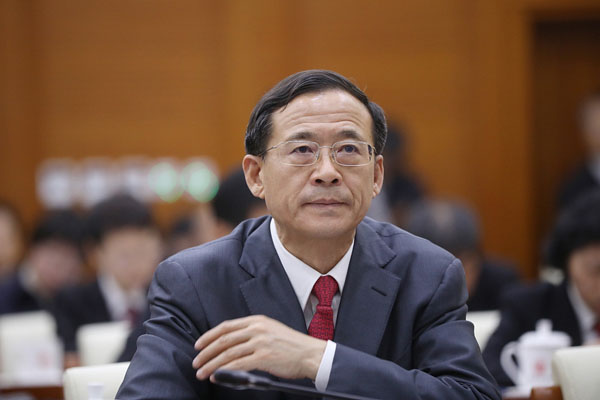Ex-regulator of securities surrenders


Anti-corruption authorities probe Liu Shiyu for violations of disciplines
Liu Shiyu, China's former top securities regulator, has surrendered to anti-corruption authorities, according to the Communist Party of China Central Commission for Discipline Inspection.
He turned himself in and is cooperating with the CCDI and National Commission of Supervision for investigation of "suspected violations of disciplines and laws" the CCDI said in a statement on its website on Sunday night, without giving more details.
Liu, 57, once served as the assistant to the president of the People's Bank of China, vice-president of the People's Bank of China, and chairman of the Agricultural Bank of China. In 2016, he was appointed head of the China Securities Regulatory Commission.
He launched a crackdown on what he called big financial "crocodiles" and "barbarians", who were tycoons who wield capital power to manipulate stock prices and disrupt fair market play.
"We should prevent some people from creating winds and waves in the stock market. The big financial crocodiles will not be allowed to suck the blood of small investors," he was quoted by Chinese media outlets Caixin and Sina.com as saying at the time.
He said in the financial market, the temptation of money is enormous. "There is a spur of the moment between angels and devils. There is only half a step away between the financiers and financial crocodiles in the capital market."
From February 2016 to January, when he served as the head of CSRC, he imposed administrative penalties amounting to 22.4 billion yuan ($3.24 billion) and restricted 132 people from having access to the market.
In January, he was replaced by Yi Huiman, former chairman of the giant Industrial and Commercial Bank of China.
Liu was the second ministerial-level official to surrender to anti-corruption authorities since the 18th National Congress of the Communist Party of China in late 2012.
Earlier this month, Qin Guangrong, former Party chief of Yunnan province, also turned himself in and is being probed by the CCDI and National Commission for Supervision for alleged graft issues.
According to the CCDI, about 27,000 Party members have actively confessed to violating disciplines and laws since the 19th National Congress of the Communist Party of China in 2017, and about 5,000 Party officials have pleaded guilty.
Tian Kun, associate research fellow of the Chinese Academy of Social Sciences, said, "more and more corrupt officials choose to confess their crimes, mainly because they are moved by the policy of 'combining punishment with leniency' to seek a lenient punishment."
Zhuang Deshui, a researcher at Peking University of clean governance, said only when corrupt officials feel more and more pressure from the firm determination of authorities' anti-corruption efforts will they choose to turn themselves in.
- Survivor of Japan's 'comfort women' system dies
- 19 foreigners among China's first officially certified hotpot chefs
- China approves new lunar sample research applications from institutions
- Fishing, Hunting festival opens at Chagan Lake in Jilin
- A glimpse of Xi's global insights through maxims quoted in 2024
- China's 'Ice City' cracks down on ticket scalping in winter tourism




































